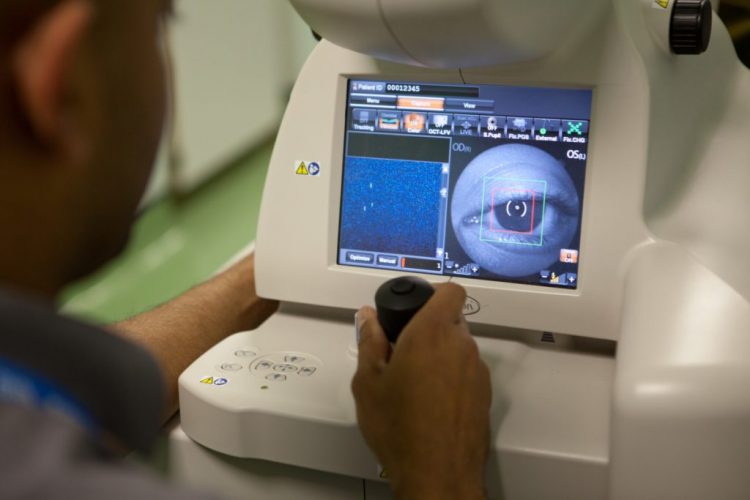Virtual retina meeting
How artificial intelligence is transforming diagnostics in ophthalmology is one of the topics being discussed at the 21st annual Retina 2020 conference

Colin Kerr
Published: Thursday, November 5, 2020
 Close-up of an OCT machine performing a scan. Image courtesy of Pearse A.Keane,MD,FRCOpth
How artificial intelligence is transforming diagnostics in ophthalmology is one of the topics being discussed at the 21st annual Retina 2020 conference taking place online on Friday November 6 from 9.30am to 4pm.
The conference, organised by Fighting Blindness and supported by Novartis, brings together some of the world’s leading scientists at the vanguard of discovery to find treatments and cures for conditions causing vision impairment and blindness.
The event will see the launch of Retina Network Ireland, a new all-island network of early- to mid-career researchers, clinicians and allied healthcare professionals working across the spectrum of retinal disease. This initiative, which aims to foster collegiality and partnership in the eye community, is supported by Bayer Ireland and the Health Research Board.
Among the topics being discussed are:
*How artificial intelligence has the potential to revolutionise patients’ treatment, with faster results affording earlier diagnosis, prompt treatment, and ultimately preventing avoidable sight loss (Dr Pearse Keane)
*Employing adaptive optics to monitor patient populations over time in understanding the rate of progression in inherited retinal diseases for assessing eligibility for clinical trials and for measuring trial outcomes (Dr Jacque Duncan)
*Inherited retinal degenerations and syndromic diseases, and the experiences of patients who have received a gene therapy (Prof. Bart Leroy)
*Exploring the power of language and how we can use it to educate, entertain and inspire in science communication (Jonathan McCrea)
*Using the smartphone to screen for glaucoma (Dr Kate Coleman)
For details of the full conference programme, and to register free of charge, visit www.retina.ie.
Close-up of an OCT machine performing a scan. Image courtesy of Pearse A.Keane,MD,FRCOpth
How artificial intelligence is transforming diagnostics in ophthalmology is one of the topics being discussed at the 21st annual Retina 2020 conference taking place online on Friday November 6 from 9.30am to 4pm.
The conference, organised by Fighting Blindness and supported by Novartis, brings together some of the world’s leading scientists at the vanguard of discovery to find treatments and cures for conditions causing vision impairment and blindness.
The event will see the launch of Retina Network Ireland, a new all-island network of early- to mid-career researchers, clinicians and allied healthcare professionals working across the spectrum of retinal disease. This initiative, which aims to foster collegiality and partnership in the eye community, is supported by Bayer Ireland and the Health Research Board.
Among the topics being discussed are:
*How artificial intelligence has the potential to revolutionise patients’ treatment, with faster results affording earlier diagnosis, prompt treatment, and ultimately preventing avoidable sight loss (Dr Pearse Keane)
*Employing adaptive optics to monitor patient populations over time in understanding the rate of progression in inherited retinal diseases for assessing eligibility for clinical trials and for measuring trial outcomes (Dr Jacque Duncan)
*Inherited retinal degenerations and syndromic diseases, and the experiences of patients who have received a gene therapy (Prof. Bart Leroy)
*Exploring the power of language and how we can use it to educate, entertain and inspire in science communication (Jonathan McCrea)
*Using the smartphone to screen for glaucoma (Dr Kate Coleman)
For details of the full conference programme, and to register free of charge, visit www.retina.ie.